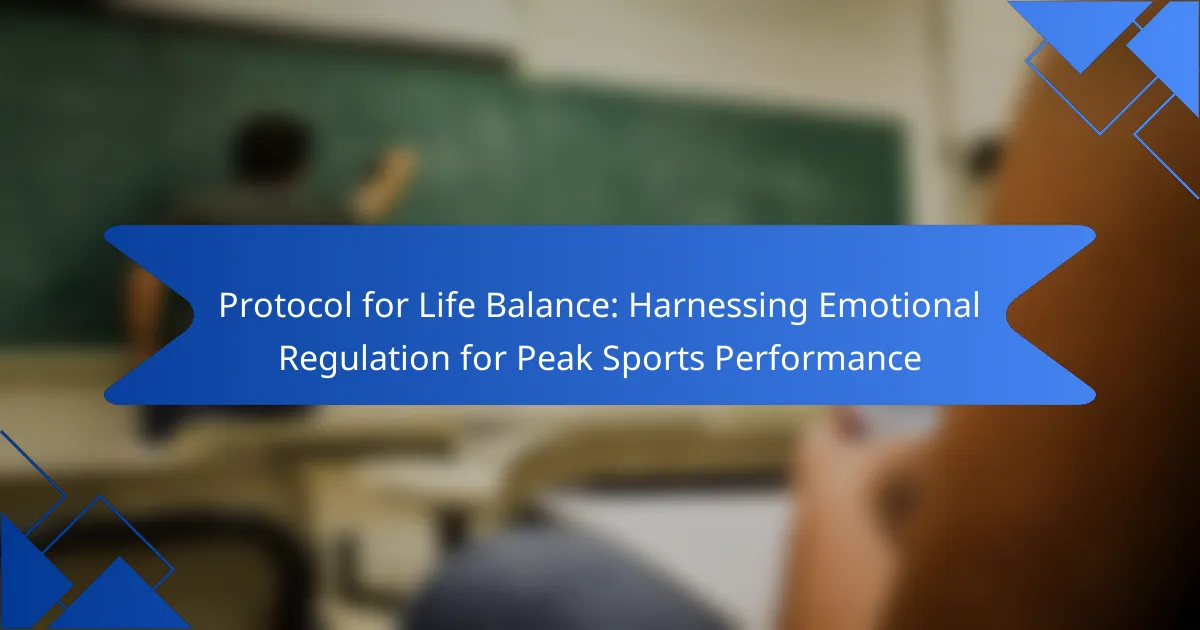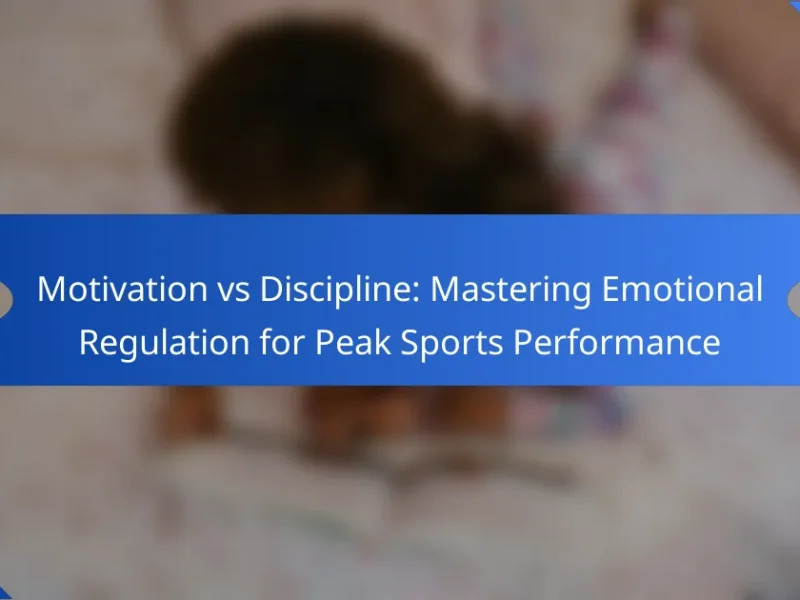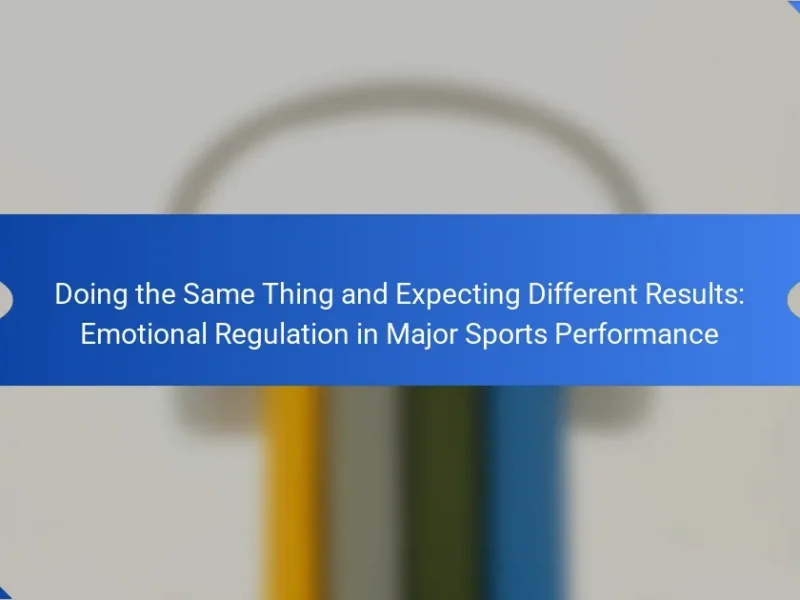Emotional regulation is vital for athletes aiming to enhance their sports performance. This article explores how effective emotional management improves focus, reduces anxiety, and fosters resilience. It highlights specific strategies like mindfulness and visualization that can boost mental toughness. Additionally, it discusses the importance of establishing a balanced routine to support emotional well-being and performance metrics.
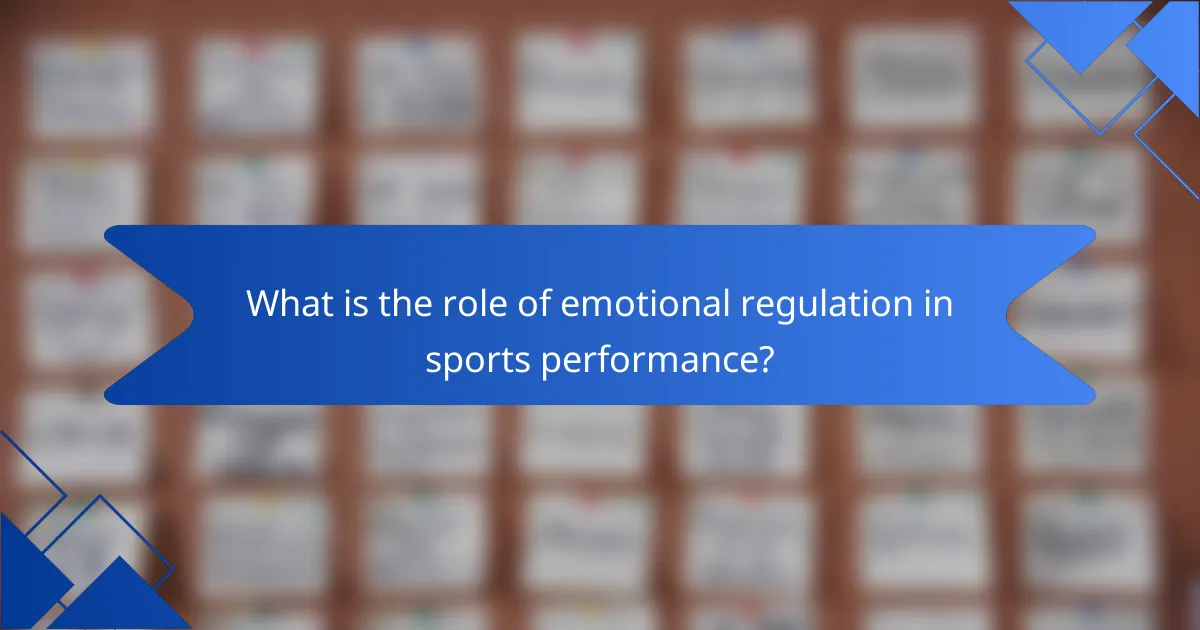
What is the role of emotional regulation in sports performance?
Emotional regulation plays a crucial role in enhancing sports performance by enabling athletes to manage stress and maintain focus. Effective emotional regulation improves decision-making and resilience during competition. Athletes who master this skill can better control anxiety and channel emotions positively, leading to improved performance outcomes. Research indicates that emotional regulation strategies, such as mindfulness and cognitive reappraisal, significantly boost athletes’ mental toughness and overall performance metrics.
How does emotional regulation impact athlete mental health?
Emotional regulation significantly enhances athlete mental health by reducing stress and improving focus. Effective regulation helps athletes manage anxiety, leading to better performance outcomes. Research indicates that athletes with strong emotional regulation skills report higher levels of well-being and lower instances of burnout. This skill supports resilience, enabling athletes to bounce back from setbacks and maintain motivation.
What are the key components of emotional regulation systems?
Emotional regulation systems consist of cognitive, physiological, and behavioral components. These elements work together to manage emotional responses effectively.
Cognitive components include awareness and appraisal of emotions, influencing how individuals interpret emotional experiences. Physiological components involve biological responses, such as heart rate and hormonal changes, which affect emotional states. Behavioral components encompass the actions taken to express or suppress emotions, impacting overall performance.
Enhancing these systems can lead to improved emotional resilience, crucial for athletes aiming for peak performance. Emotional regulation training can refine these components, fostering better focus and adaptability during competition.
What techniques are commonly used for emotional regulation?
Common techniques for emotional regulation include mindfulness, cognitive restructuring, and deep breathing exercises. These methods help athletes manage emotions, enhancing focus and performance. Mindfulness promotes present-moment awareness, reducing anxiety. Cognitive restructuring challenges negative thoughts, fostering a positive mindset. Deep breathing exercises activate the relaxation response, lowering stress levels. Each technique contributes uniquely to emotional balance, essential for peak sports performance.
How does emotional intelligence relate to emotional regulation?
Emotional intelligence significantly enhances emotional regulation, crucial for peak sports performance. Athletes with high emotional intelligence can effectively manage their emotions, leading to improved focus and resilience during competition. This regulation enables better decision-making and stress management, essential for achieving optimal performance levels. Emotional intelligence fosters self-awareness, allowing athletes to recognize emotional triggers and respond constructively. As a result, emotional regulation becomes a vital skill set that supports sustained athletic excellence.

What are the universal benefits of effective emotional regulation?
Effective emotional regulation enhances sports performance by improving focus, reducing anxiety, and fostering resilience. Athletes who master these skills experience increased motivation and better decision-making under pressure. Research shows that emotional regulation techniques can lead to a 20% improvement in performance metrics. Additionally, athletes with strong emotional regulation skills report higher overall satisfaction and well-being. This unique attribute of emotional resilience is essential for sustaining peak performance in competitive environments.
How does emotional regulation enhance focus and concentration?
Emotional regulation significantly enhances focus and concentration by allowing athletes to manage stress and anxiety. This control leads to improved mental clarity and decision-making during performance. Studies show that athletes who practice emotional regulation techniques, such as mindfulness and breathing exercises, report higher levels of concentration. By minimizing distractions, emotional regulation enables individuals to maintain a steady focus on their goals, ultimately optimizing their performance in sports.
What is the relationship between emotional regulation and stress management?
Emotional regulation significantly enhances stress management, leading to improved sports performance. Effective emotional regulation allows athletes to maintain focus, control anxiety, and adapt to challenges. Studies show that athletes with strong emotional regulation skills experience lower stress levels and better recovery from setbacks. This ability to manage emotions directly impacts performance outcomes, making emotional regulation a unique attribute in achieving peak sports performance.
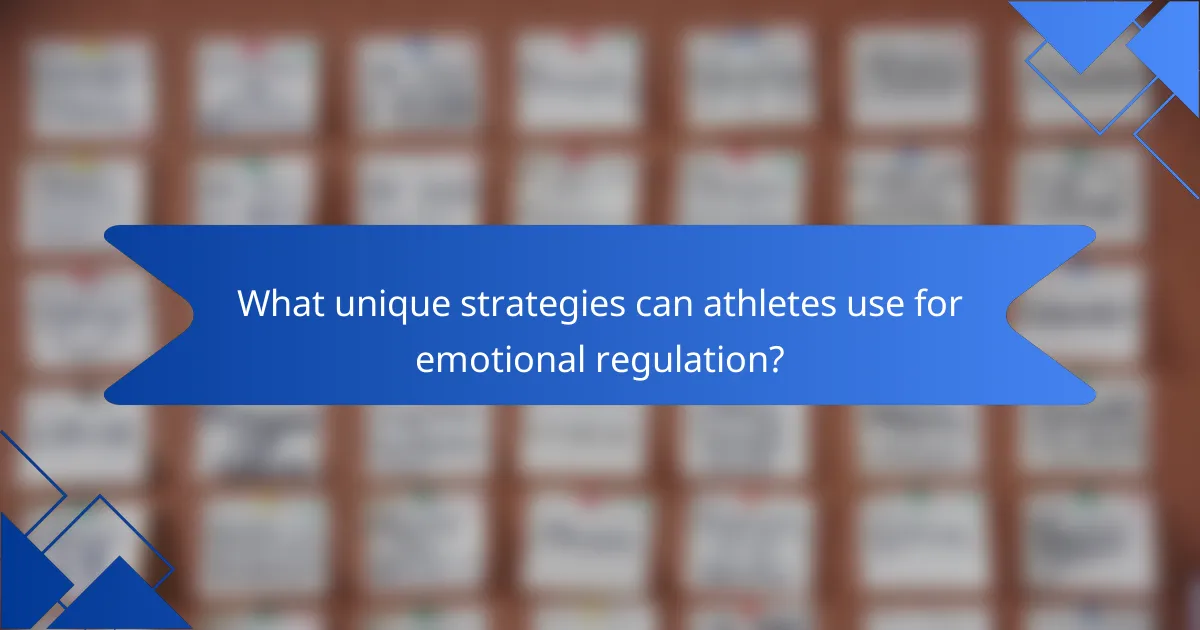
What unique strategies can athletes use for emotional regulation?
Athletes can employ unique strategies such as mindfulness, visualization, and controlled breathing to enhance emotional regulation. Mindfulness promotes present-moment awareness, reducing anxiety. Visualization helps in mentally rehearsing performance scenarios, boosting confidence. Controlled breathing techniques can lower stress levels, allowing for better focus during competitions. These methods contribute to improved emotional stability, ultimately enhancing sports performance.
How can visualization techniques aid emotional regulation?
Visualization techniques significantly enhance emotional regulation by allowing athletes to mentally rehearse scenarios and manage stress. These techniques foster a positive mindset, improving focus and resilience during competition. Research indicates that visualizing successful performance can decrease anxiety and enhance overall emotional stability. Regular practice of these techniques cultivates a unique skill set that athletes can rely on during high-pressure situations, ultimately leading to peak sports performance.
What role does mindfulness play in emotional regulation for athletes?
Mindfulness significantly enhances emotional regulation for athletes by promoting self-awareness and focus. It helps athletes manage stress, anxiety, and emotional responses during competition. Research indicates that mindfulness practices can lead to improved performance metrics, such as reaction time and decision-making. Additionally, athletes who engage in mindfulness report greater emotional resilience and a more positive outlook, contributing to overall sports performance. By incorporating mindfulness into training, athletes can better regulate their emotions, leading to peak performance under pressure.
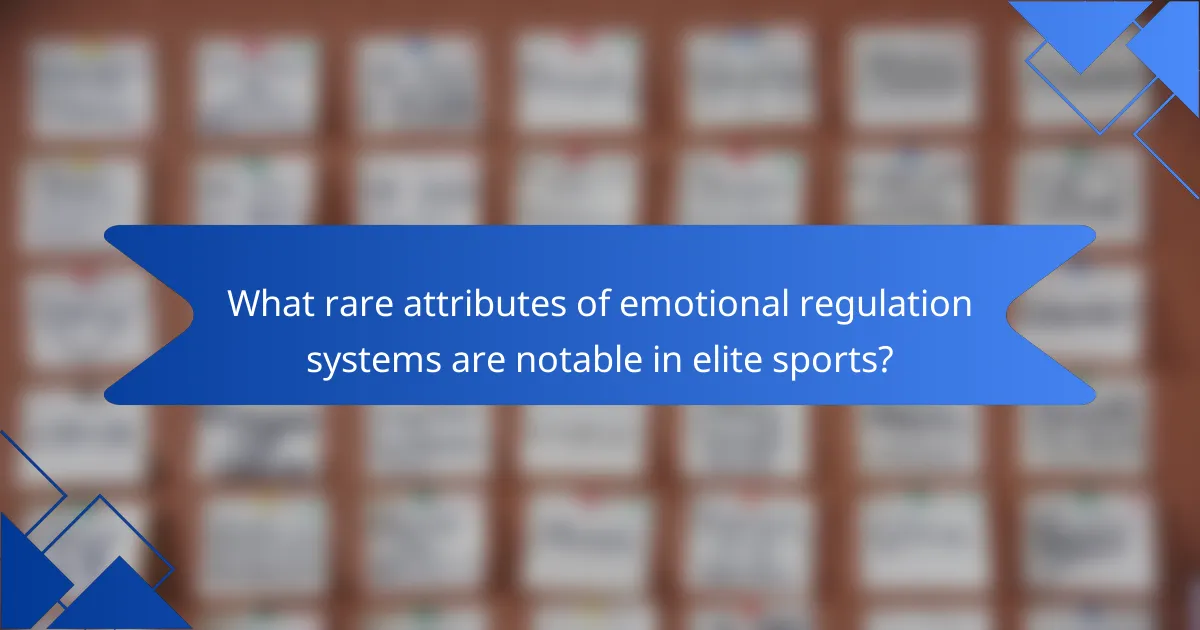
What rare attributes of emotional regulation systems are notable in elite sports?
Elite athletes exhibit rare attributes of emotional regulation systems, enhancing their performance under pressure. These include heightened emotional awareness, allowing quick recognition of feelings, and adaptive coping strategies that facilitate resilience. Additionally, they often demonstrate a unique ability to maintain focus amidst distractions, which is crucial for peak performance. This mastery of emotional regulation contributes significantly to their competitive edge.
How do cultural differences affect emotional regulation practices in sports?
Cultural differences significantly influence emotional regulation practices in sports. Various cultures prioritize distinct emotional expressions and coping mechanisms, impacting athletes’ performance and interactions.
For instance, collectivist cultures may emphasize group harmony, leading athletes to regulate emotions in ways that maintain team cohesion. In contrast, individualistic cultures often encourage personal emotional expression, allowing athletes to channel emotions differently.
Research indicates that athletes from different cultural backgrounds may utilize unique strategies for emotional regulation, affecting their resilience and adaptability during competitions. Understanding these cultural nuances can enhance coaching methods and improve overall sports performance.
What are the emerging technologies aiding emotional regulation in athletes?
Emerging technologies aiding emotional regulation in athletes include biofeedback, virtual reality, and wearable devices. These tools enhance self-awareness and resilience, leading to improved performance. Biofeedback provides real-time data on physiological responses, allowing athletes to adjust their emotional states. Virtual reality simulations create immersive environments for practicing coping strategies. Wearable devices track stress levels, promoting proactive emotional management. Together, these technologies represent a unique attribute of modern sports performance enhancement.
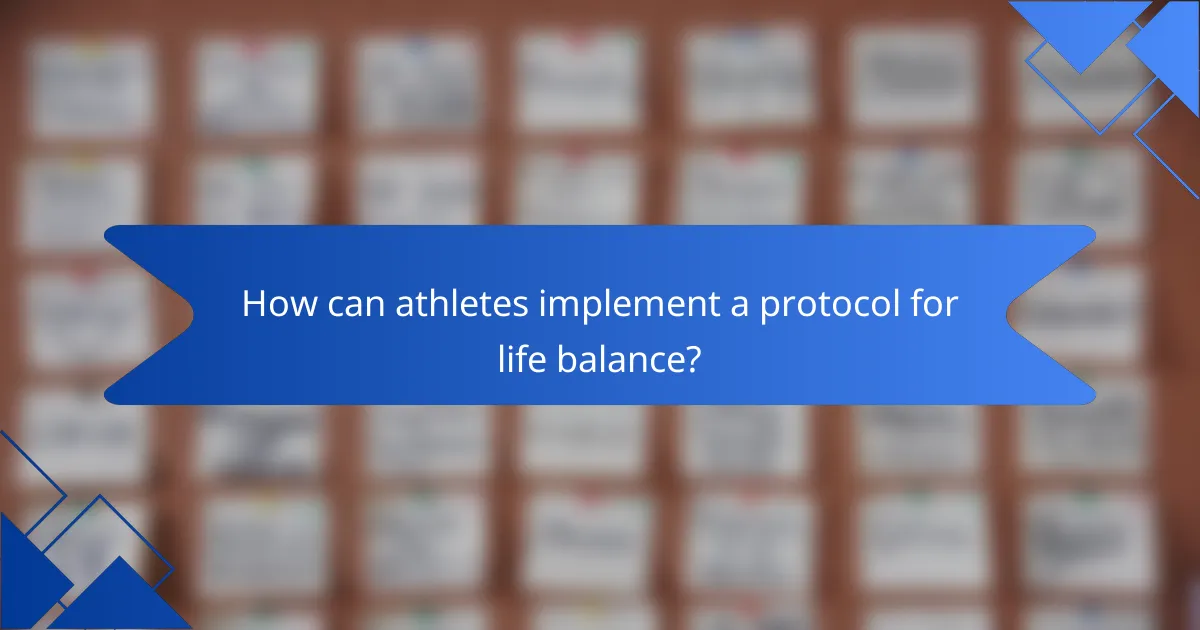
How can athletes implement a protocol for life balance?
Athletes can implement a protocol for life balance by prioritizing emotional regulation techniques. These techniques enhance focus, reduce stress, and improve performance.
Establishing a daily routine that includes mindfulness practices, such as meditation or deep breathing, can help athletes manage their emotions effectively. Regular physical activity, adequate sleep, and a balanced diet further support emotional well-being.
Tracking emotional states and performance metrics can provide insights into the effectiveness of the protocol. Adjustments can be made based on this data to optimize life balance and athletic performance.
Engaging with a sports psychologist may offer personalized strategies for emotional regulation, ensuring athletes maintain peak performance while achieving life balance.
What are best practices for integrating emotional regulation into training?
Integrating emotional regulation into training enhances athletes’ performance and resilience. Best practices include implementing structured mindfulness exercises, fostering open communication, and utilizing biofeedback techniques. Regularly scheduled emotional check-ins can help athletes recognize and manage their feelings. Additionally, incorporating visualization strategies allows athletes to mentally rehearse emotional responses during competition. A focus on growth mindset can encourage adaptability and perseverance.
What common mistakes do athletes make in emotional regulation?
Athletes often overlook the importance of self-awareness, leading to ineffective emotional regulation. Common mistakes include suppressing emotions, failing to seek support, and neglecting mental preparation. These errors can hinder performance and increase stress. Additionally, athletes may misinterpret emotional signals, resulting in poor decision-making during competition. Recognizing and addressing these mistakes is crucial for enhancing emotional regulation and achieving peak sports performance.
What expert insights can optimize emotional regulation for peak performance?
Implementing expert insights can significantly enhance emotional regulation, leading to peak sports performance. Techniques such as mindfulness training, cognitive restructuring, and biofeedback are effective methods. Mindfulness helps athletes remain present, reducing anxiety. Cognitive restructuring allows for reframing negative thoughts into positive ones, fostering resilience. Biofeedback provides real-time data on physiological responses, enabling athletes to adjust their emotional states effectively. These strategies collectively promote a balanced emotional state, crucial for optimal performance.
